Economics 2: UK Economy, Inflation, Interest Rates, and Slow Growth
VerifiedAdded on 2023/06/09
|12
|2601
|281
Report
AI Summary
This report provides an in-depth analysis of the UK economy, focusing on key macroeconomic concepts such as inflation, the impact of sterling depreciation, and the effects of interest rate policies implemented by the Monetary Policy Committee. It examines the factors contributing to the slow economic growth experienced in the first quarter of 2018, including unfavorable weather conditions and decreased consumer spending. Furthermore, the report explores the implications of a tight monetary policy on the UK economy, considering its potential to curb inflation while also potentially hindering economic growth. The analysis concludes with recommendations for balancing monetary policy to manage inflation and stimulate economic growth, suggesting a limited increase in interest rates and the implementation of stimulatory policies by the government. Desklib provides access to a wealth of similar resources, including past papers and solved assignments, to support students in their academic endeavors.
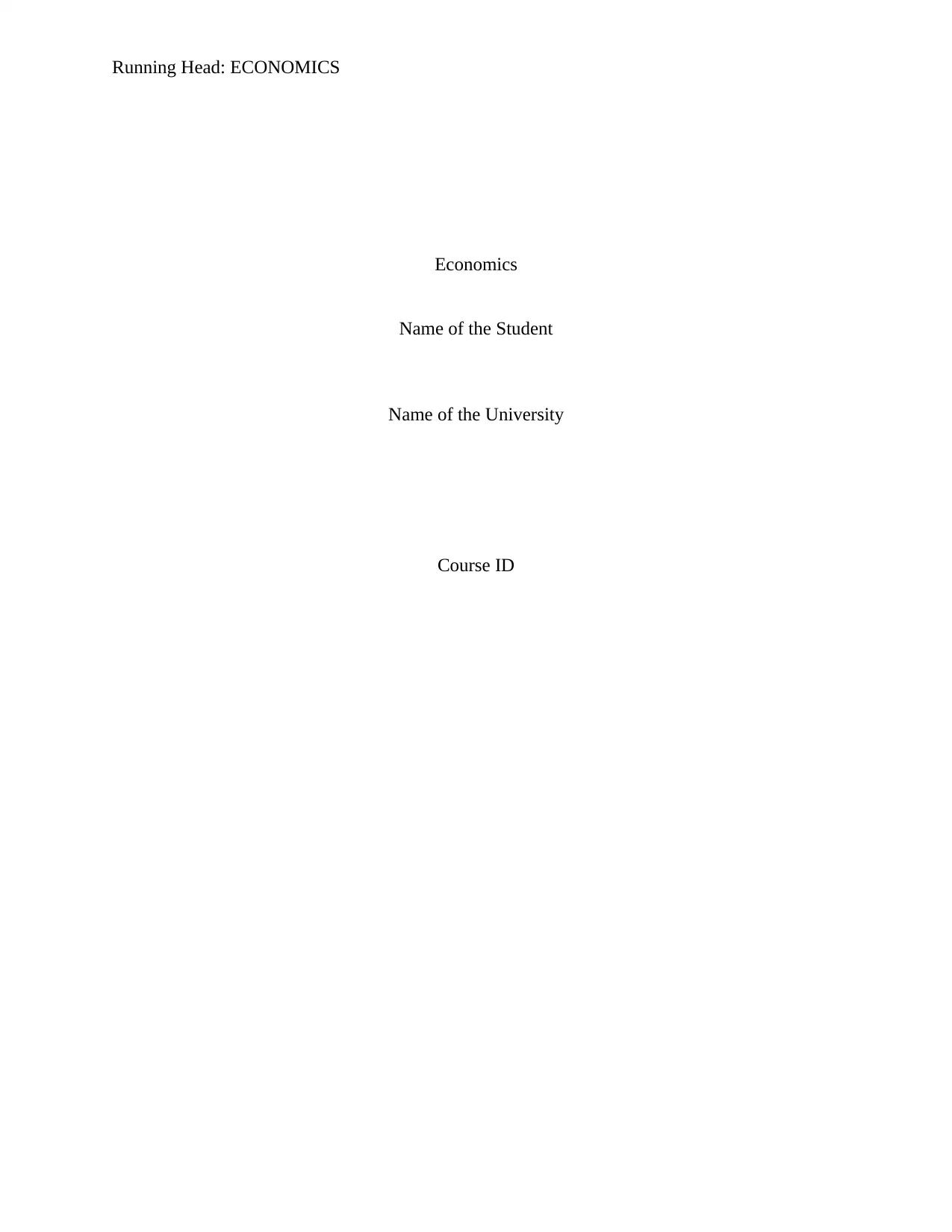
Running Head: ECONOMICS
Economics
Name of the Student
Name of the University
Course ID
Economics
Name of the Student
Name of the University
Course ID
Paraphrase This Document
Need a fresh take? Get an instant paraphrase of this document with our AI Paraphraser
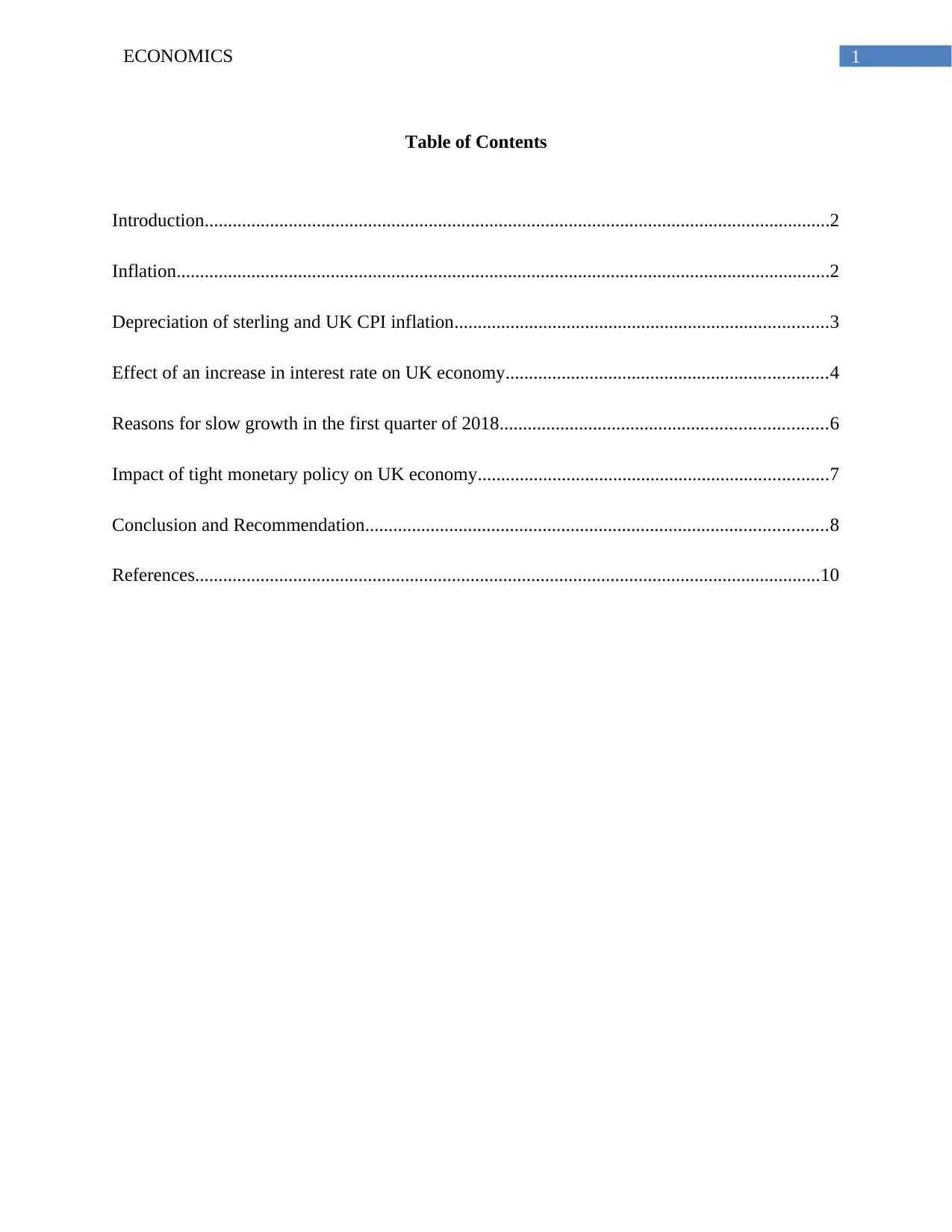
1ECONOMICS
Table of Contents
Introduction......................................................................................................................................2
Inflation............................................................................................................................................2
Depreciation of sterling and UK CPI inflation................................................................................3
Effect of an increase in interest rate on UK economy.....................................................................4
Reasons for slow growth in the first quarter of 2018......................................................................6
Impact of tight monetary policy on UK economy...........................................................................7
Conclusion and Recommendation...................................................................................................8
References......................................................................................................................................10
Table of Contents
Introduction......................................................................................................................................2
Inflation............................................................................................................................................2
Depreciation of sterling and UK CPI inflation................................................................................3
Effect of an increase in interest rate on UK economy.....................................................................4
Reasons for slow growth in the first quarter of 2018......................................................................6
Impact of tight monetary policy on UK economy...........................................................................7
Conclusion and Recommendation...................................................................................................8
References......................................................................................................................................10
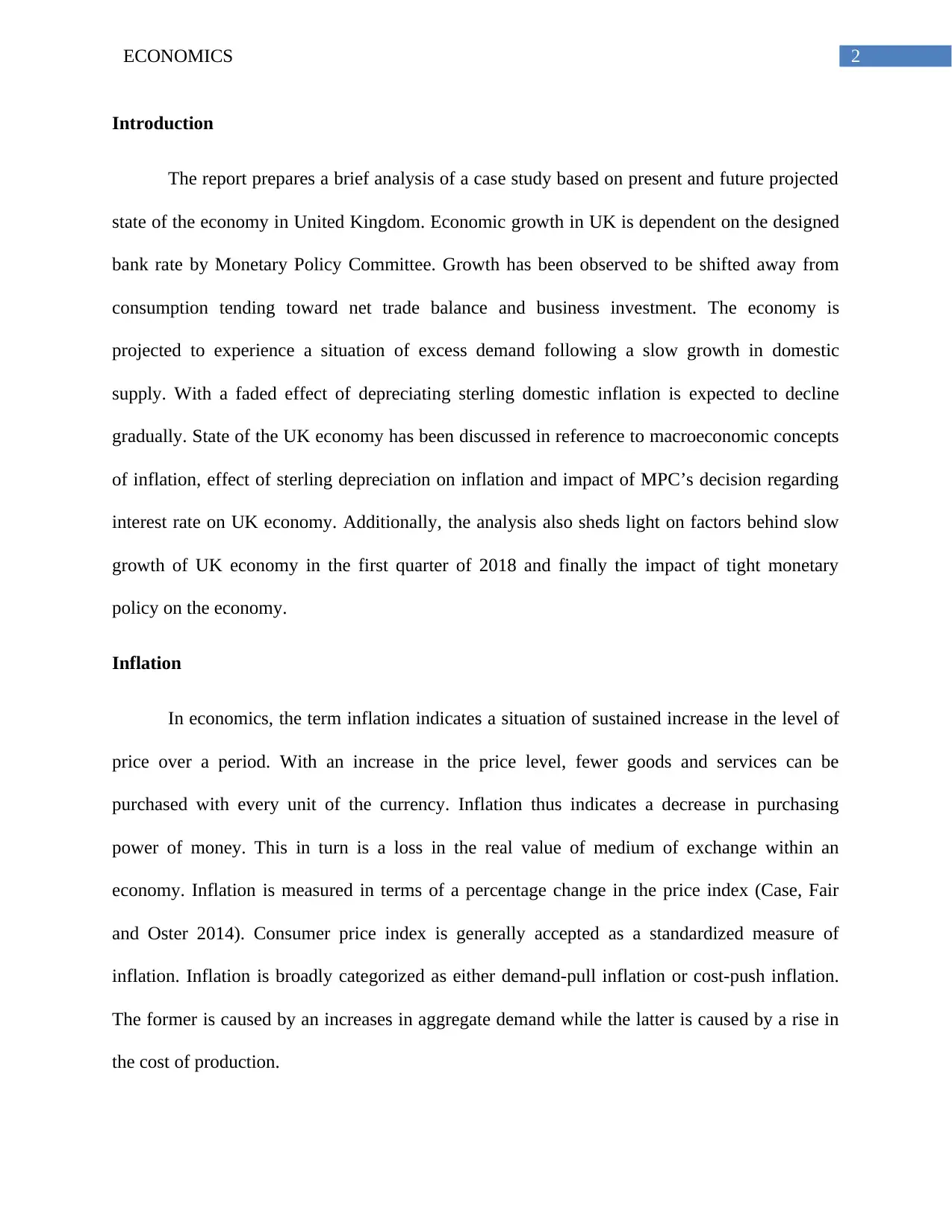
2ECONOMICS
Introduction
The report prepares a brief analysis of a case study based on present and future projected
state of the economy in United Kingdom. Economic growth in UK is dependent on the designed
bank rate by Monetary Policy Committee. Growth has been observed to be shifted away from
consumption tending toward net trade balance and business investment. The economy is
projected to experience a situation of excess demand following a slow growth in domestic
supply. With a faded effect of depreciating sterling domestic inflation is expected to decline
gradually. State of the UK economy has been discussed in reference to macroeconomic concepts
of inflation, effect of sterling depreciation on inflation and impact of MPC’s decision regarding
interest rate on UK economy. Additionally, the analysis also sheds light on factors behind slow
growth of UK economy in the first quarter of 2018 and finally the impact of tight monetary
policy on the economy.
Inflation
In economics, the term inflation indicates a situation of sustained increase in the level of
price over a period. With an increase in the price level, fewer goods and services can be
purchased with every unit of the currency. Inflation thus indicates a decrease in purchasing
power of money. This in turn is a loss in the real value of medium of exchange within an
economy. Inflation is measured in terms of a percentage change in the price index (Case, Fair
and Oster 2014). Consumer price index is generally accepted as a standardized measure of
inflation. Inflation is broadly categorized as either demand-pull inflation or cost-push inflation.
The former is caused by an increases in aggregate demand while the latter is caused by a rise in
the cost of production.
Introduction
The report prepares a brief analysis of a case study based on present and future projected
state of the economy in United Kingdom. Economic growth in UK is dependent on the designed
bank rate by Monetary Policy Committee. Growth has been observed to be shifted away from
consumption tending toward net trade balance and business investment. The economy is
projected to experience a situation of excess demand following a slow growth in domestic
supply. With a faded effect of depreciating sterling domestic inflation is expected to decline
gradually. State of the UK economy has been discussed in reference to macroeconomic concepts
of inflation, effect of sterling depreciation on inflation and impact of MPC’s decision regarding
interest rate on UK economy. Additionally, the analysis also sheds light on factors behind slow
growth of UK economy in the first quarter of 2018 and finally the impact of tight monetary
policy on the economy.
Inflation
In economics, the term inflation indicates a situation of sustained increase in the level of
price over a period. With an increase in the price level, fewer goods and services can be
purchased with every unit of the currency. Inflation thus indicates a decrease in purchasing
power of money. This in turn is a loss in the real value of medium of exchange within an
economy. Inflation is measured in terms of a percentage change in the price index (Case, Fair
and Oster 2014). Consumer price index is generally accepted as a standardized measure of
inflation. Inflation is broadly categorized as either demand-pull inflation or cost-push inflation.
The former is caused by an increases in aggregate demand while the latter is caused by a rise in
the cost of production.
⊘ This is a preview!⊘
Do you want full access?
Subscribe today to unlock all pages.

Trusted by 1+ million students worldwide
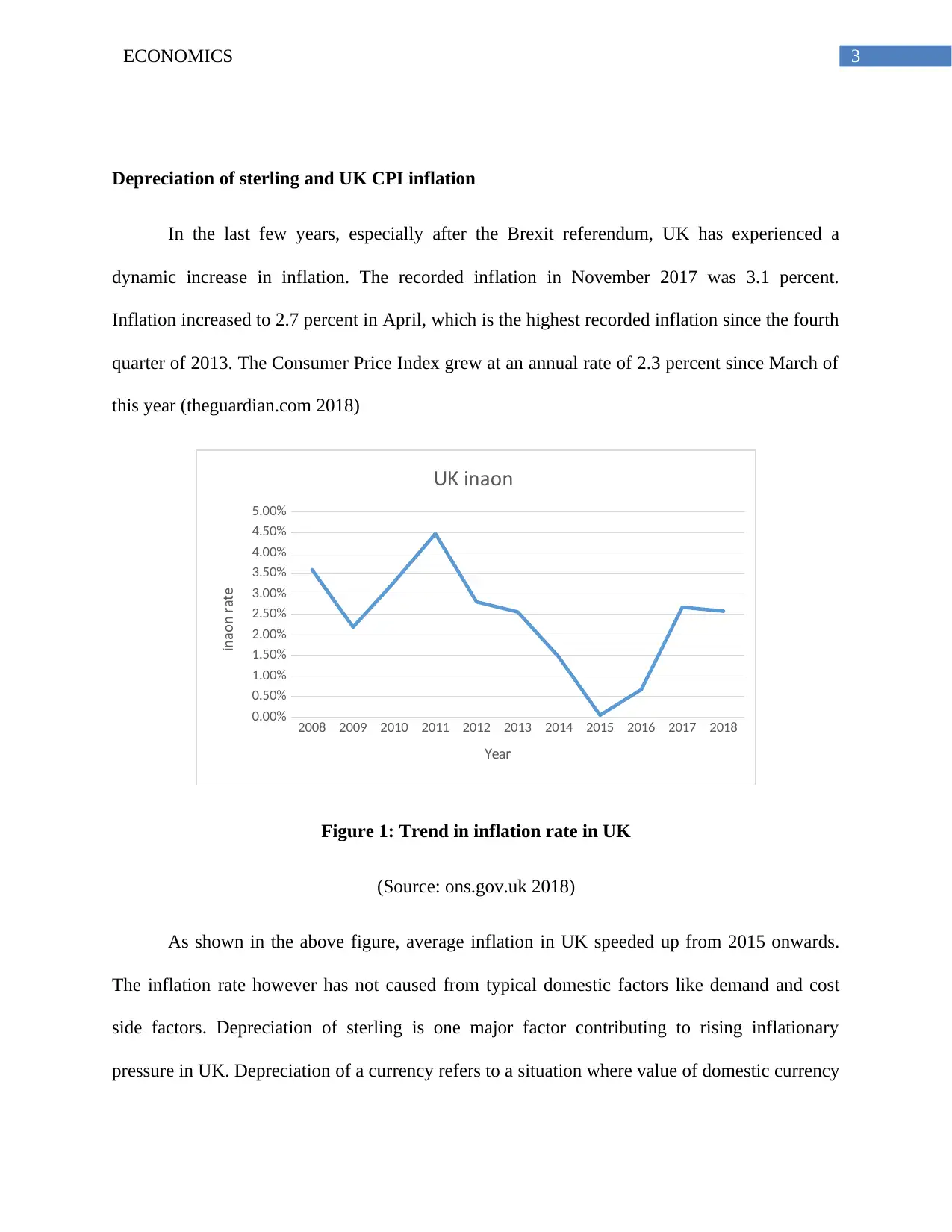
3ECONOMICS
Depreciation of sterling and UK CPI inflation
In the last few years, especially after the Brexit referendum, UK has experienced a
dynamic increase in inflation. The recorded inflation in November 2017 was 3.1 percent.
Inflation increased to 2.7 percent in April, which is the highest recorded inflation since the fourth
quarter of 2013. The Consumer Price Index grew at an annual rate of 2.3 percent since March of
this year (theguardian.com 2018)
2008 2009 2010 2011 2012 2013 2014 2015 2016 2017 2018
0.00%
0.50%
1.00%
1.50%
2.00%
2.50%
3.00%
3.50%
4.00%
4.50%
5.00%
inflationUK
earY
inflation rate
Figure 1: Trend in inflation rate in UK
(Source: ons.gov.uk 2018)
As shown in the above figure, average inflation in UK speeded up from 2015 onwards.
The inflation rate however has not caused from typical domestic factors like demand and cost
side factors. Depreciation of sterling is one major factor contributing to rising inflationary
pressure in UK. Depreciation of a currency refers to a situation where value of domestic currency
Depreciation of sterling and UK CPI inflation
In the last few years, especially after the Brexit referendum, UK has experienced a
dynamic increase in inflation. The recorded inflation in November 2017 was 3.1 percent.
Inflation increased to 2.7 percent in April, which is the highest recorded inflation since the fourth
quarter of 2013. The Consumer Price Index grew at an annual rate of 2.3 percent since March of
this year (theguardian.com 2018)
2008 2009 2010 2011 2012 2013 2014 2015 2016 2017 2018
0.00%
0.50%
1.00%
1.50%
2.00%
2.50%
3.00%
3.50%
4.00%
4.50%
5.00%
inflationUK
earY
inflation rate
Figure 1: Trend in inflation rate in UK
(Source: ons.gov.uk 2018)
As shown in the above figure, average inflation in UK speeded up from 2015 onwards.
The inflation rate however has not caused from typical domestic factors like demand and cost
side factors. Depreciation of sterling is one major factor contributing to rising inflationary
pressure in UK. Depreciation of a currency refers to a situation where value of domestic currency
Paraphrase This Document
Need a fresh take? Get an instant paraphrase of this document with our AI Paraphraser
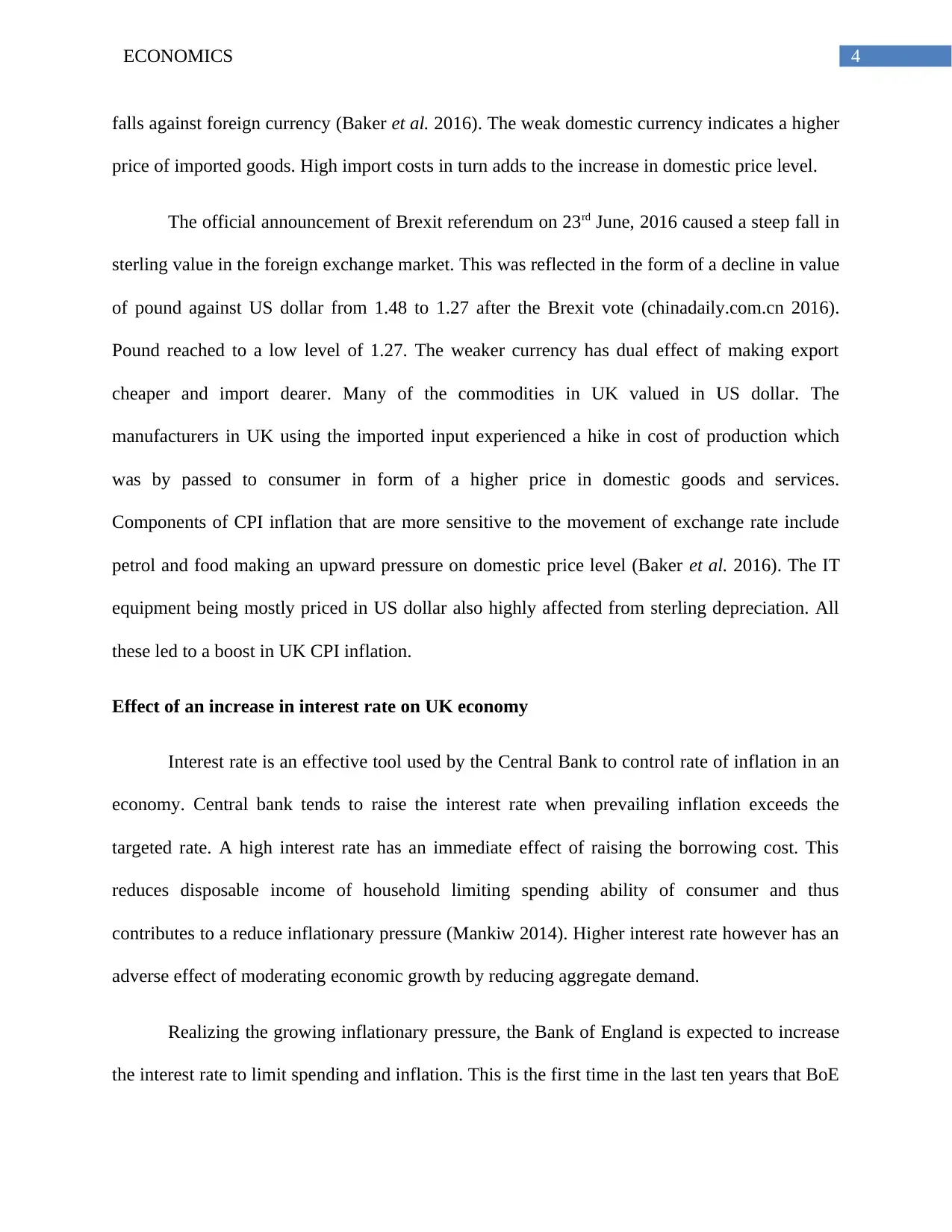
4ECONOMICS
falls against foreign currency (Baker et al. 2016). The weak domestic currency indicates a higher
price of imported goods. High import costs in turn adds to the increase in domestic price level.
The official announcement of Brexit referendum on 23rd June, 2016 caused a steep fall in
sterling value in the foreign exchange market. This was reflected in the form of a decline in value
of pound against US dollar from 1.48 to 1.27 after the Brexit vote (chinadaily.com.cn 2016).
Pound reached to a low level of 1.27. The weaker currency has dual effect of making export
cheaper and import dearer. Many of the commodities in UK valued in US dollar. The
manufacturers in UK using the imported input experienced a hike in cost of production which
was by passed to consumer in form of a higher price in domestic goods and services.
Components of CPI inflation that are more sensitive to the movement of exchange rate include
petrol and food making an upward pressure on domestic price level (Baker et al. 2016). The IT
equipment being mostly priced in US dollar also highly affected from sterling depreciation. All
these led to a boost in UK CPI inflation.
Effect of an increase in interest rate on UK economy
Interest rate is an effective tool used by the Central Bank to control rate of inflation in an
economy. Central bank tends to raise the interest rate when prevailing inflation exceeds the
targeted rate. A high interest rate has an immediate effect of raising the borrowing cost. This
reduces disposable income of household limiting spending ability of consumer and thus
contributes to a reduce inflationary pressure (Mankiw 2014). Higher interest rate however has an
adverse effect of moderating economic growth by reducing aggregate demand.
Realizing the growing inflationary pressure, the Bank of England is expected to increase
the interest rate to limit spending and inflation. This is the first time in the last ten years that BoE
falls against foreign currency (Baker et al. 2016). The weak domestic currency indicates a higher
price of imported goods. High import costs in turn adds to the increase in domestic price level.
The official announcement of Brexit referendum on 23rd June, 2016 caused a steep fall in
sterling value in the foreign exchange market. This was reflected in the form of a decline in value
of pound against US dollar from 1.48 to 1.27 after the Brexit vote (chinadaily.com.cn 2016).
Pound reached to a low level of 1.27. The weaker currency has dual effect of making export
cheaper and import dearer. Many of the commodities in UK valued in US dollar. The
manufacturers in UK using the imported input experienced a hike in cost of production which
was by passed to consumer in form of a higher price in domestic goods and services.
Components of CPI inflation that are more sensitive to the movement of exchange rate include
petrol and food making an upward pressure on domestic price level (Baker et al. 2016). The IT
equipment being mostly priced in US dollar also highly affected from sterling depreciation. All
these led to a boost in UK CPI inflation.
Effect of an increase in interest rate on UK economy
Interest rate is an effective tool used by the Central Bank to control rate of inflation in an
economy. Central bank tends to raise the interest rate when prevailing inflation exceeds the
targeted rate. A high interest rate has an immediate effect of raising the borrowing cost. This
reduces disposable income of household limiting spending ability of consumer and thus
contributes to a reduce inflationary pressure (Mankiw 2014). Higher interest rate however has an
adverse effect of moderating economic growth by reducing aggregate demand.
Realizing the growing inflationary pressure, the Bank of England is expected to increase
the interest rate to limit spending and inflation. This is the first time in the last ten years that BoE
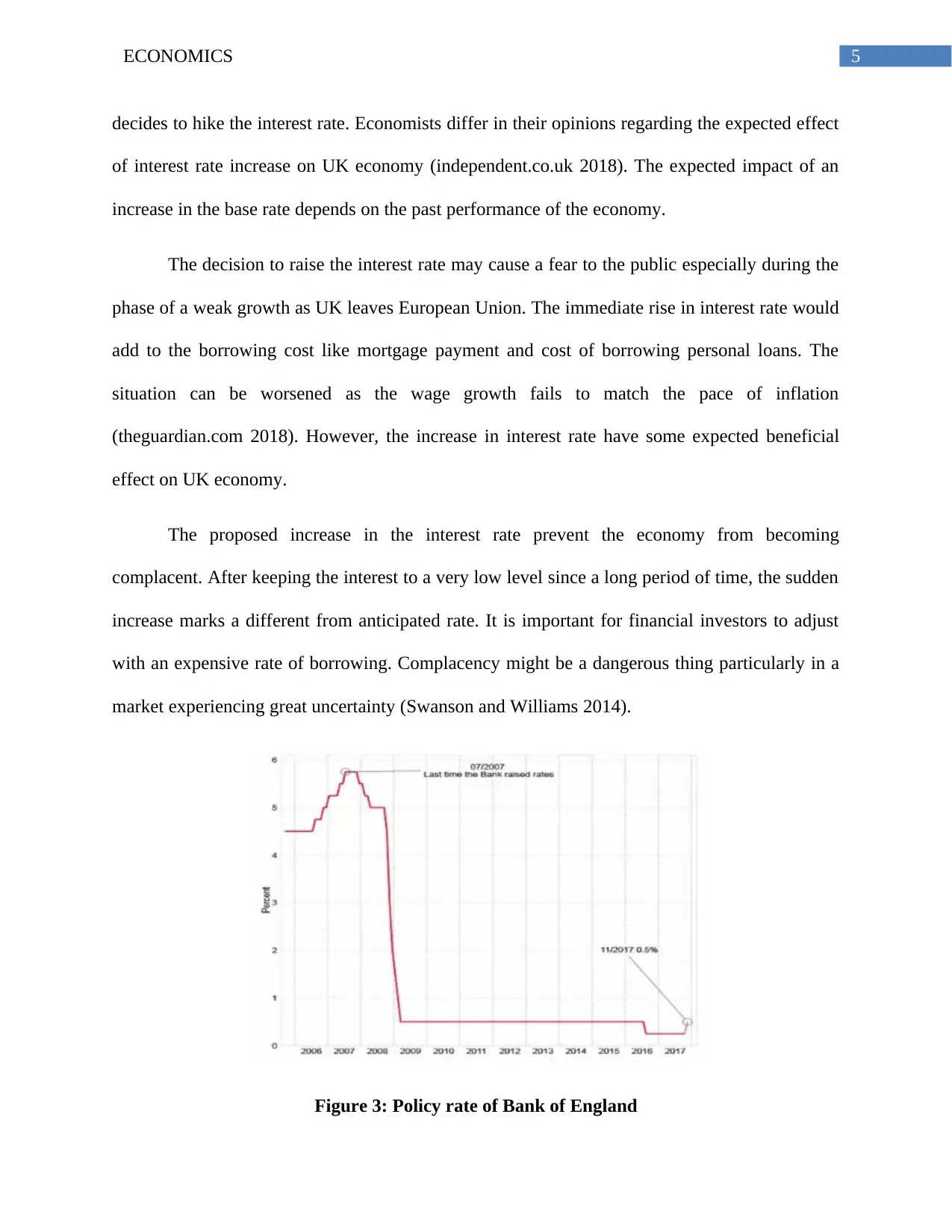
5ECONOMICS
decides to hike the interest rate. Economists differ in their opinions regarding the expected effect
of interest rate increase on UK economy (independent.co.uk 2018). The expected impact of an
increase in the base rate depends on the past performance of the economy.
The decision to raise the interest rate may cause a fear to the public especially during the
phase of a weak growth as UK leaves European Union. The immediate rise in interest rate would
add to the borrowing cost like mortgage payment and cost of borrowing personal loans. The
situation can be worsened as the wage growth fails to match the pace of inflation
(theguardian.com 2018). However, the increase in interest rate have some expected beneficial
effect on UK economy.
The proposed increase in the interest rate prevent the economy from becoming
complacent. After keeping the interest to a very low level since a long period of time, the sudden
increase marks a different from anticipated rate. It is important for financial investors to adjust
with an expensive rate of borrowing. Complacency might be a dangerous thing particularly in a
market experiencing great uncertainty (Swanson and Williams 2014).
Figure 3: Policy rate of Bank of England
decides to hike the interest rate. Economists differ in their opinions regarding the expected effect
of interest rate increase on UK economy (independent.co.uk 2018). The expected impact of an
increase in the base rate depends on the past performance of the economy.
The decision to raise the interest rate may cause a fear to the public especially during the
phase of a weak growth as UK leaves European Union. The immediate rise in interest rate would
add to the borrowing cost like mortgage payment and cost of borrowing personal loans. The
situation can be worsened as the wage growth fails to match the pace of inflation
(theguardian.com 2018). However, the increase in interest rate have some expected beneficial
effect on UK economy.
The proposed increase in the interest rate prevent the economy from becoming
complacent. After keeping the interest to a very low level since a long period of time, the sudden
increase marks a different from anticipated rate. It is important for financial investors to adjust
with an expensive rate of borrowing. Complacency might be a dangerous thing particularly in a
market experiencing great uncertainty (Swanson and Williams 2014).
Figure 3: Policy rate of Bank of England
⊘ This is a preview!⊘
Do you want full access?
Subscribe today to unlock all pages.

Trusted by 1+ million students worldwide
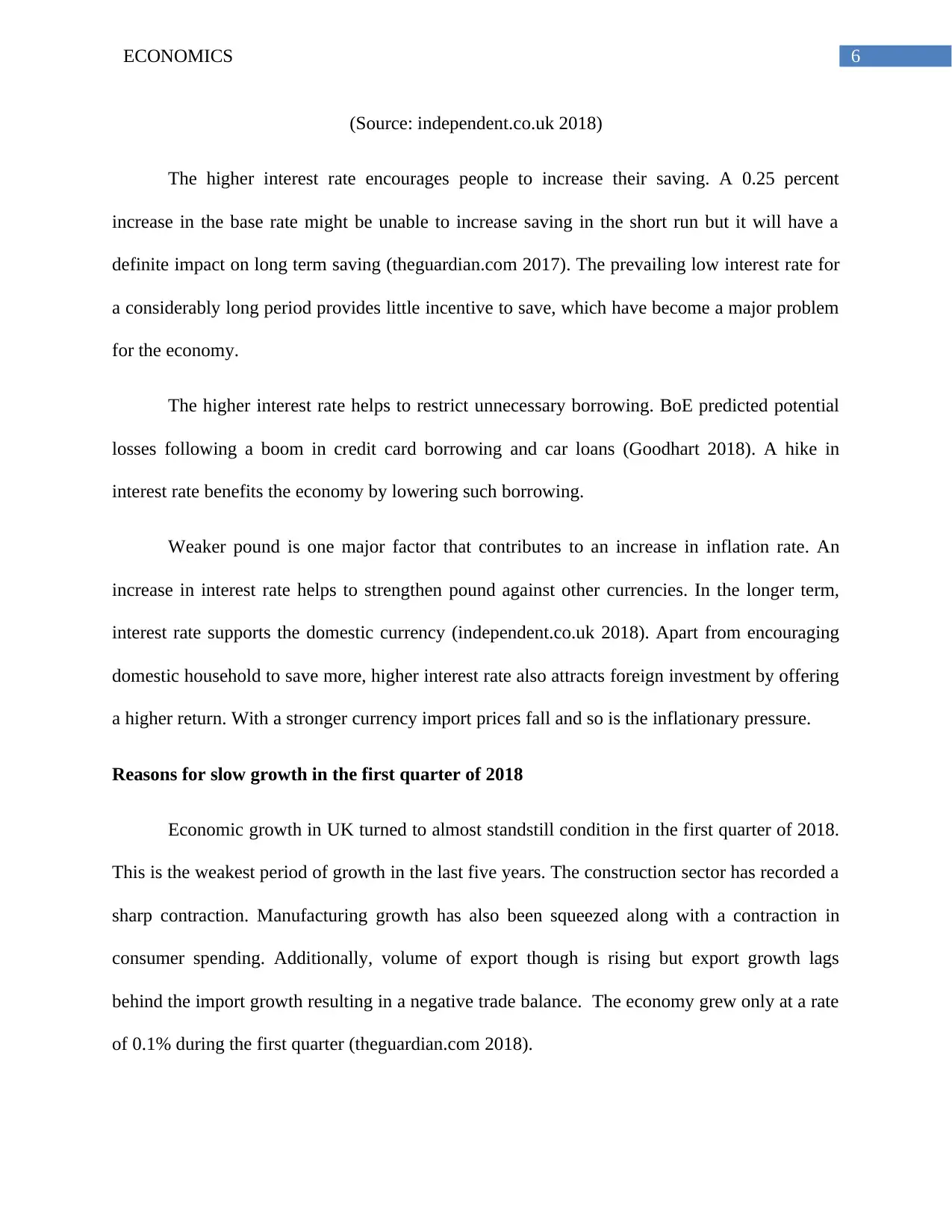
6ECONOMICS
(Source: independent.co.uk 2018)
The higher interest rate encourages people to increase their saving. A 0.25 percent
increase in the base rate might be unable to increase saving in the short run but it will have a
definite impact on long term saving (theguardian.com 2017). The prevailing low interest rate for
a considerably long period provides little incentive to save, which have become a major problem
for the economy.
The higher interest rate helps to restrict unnecessary borrowing. BoE predicted potential
losses following a boom in credit card borrowing and car loans (Goodhart 2018). A hike in
interest rate benefits the economy by lowering such borrowing.
Weaker pound is one major factor that contributes to an increase in inflation rate. An
increase in interest rate helps to strengthen pound against other currencies. In the longer term,
interest rate supports the domestic currency (independent.co.uk 2018). Apart from encouraging
domestic household to save more, higher interest rate also attracts foreign investment by offering
a higher return. With a stronger currency import prices fall and so is the inflationary pressure.
Reasons for slow growth in the first quarter of 2018
Economic growth in UK turned to almost standstill condition in the first quarter of 2018.
This is the weakest period of growth in the last five years. The construction sector has recorded a
sharp contraction. Manufacturing growth has also been squeezed along with a contraction in
consumer spending. Additionally, volume of export though is rising but export growth lags
behind the import growth resulting in a negative trade balance. The economy grew only at a rate
of 0.1% during the first quarter (theguardian.com 2018).
(Source: independent.co.uk 2018)
The higher interest rate encourages people to increase their saving. A 0.25 percent
increase in the base rate might be unable to increase saving in the short run but it will have a
definite impact on long term saving (theguardian.com 2017). The prevailing low interest rate for
a considerably long period provides little incentive to save, which have become a major problem
for the economy.
The higher interest rate helps to restrict unnecessary borrowing. BoE predicted potential
losses following a boom in credit card borrowing and car loans (Goodhart 2018). A hike in
interest rate benefits the economy by lowering such borrowing.
Weaker pound is one major factor that contributes to an increase in inflation rate. An
increase in interest rate helps to strengthen pound against other currencies. In the longer term,
interest rate supports the domestic currency (independent.co.uk 2018). Apart from encouraging
domestic household to save more, higher interest rate also attracts foreign investment by offering
a higher return. With a stronger currency import prices fall and so is the inflationary pressure.
Reasons for slow growth in the first quarter of 2018
Economic growth in UK turned to almost standstill condition in the first quarter of 2018.
This is the weakest period of growth in the last five years. The construction sector has recorded a
sharp contraction. Manufacturing growth has also been squeezed along with a contraction in
consumer spending. Additionally, volume of export though is rising but export growth lags
behind the import growth resulting in a negative trade balance. The economy grew only at a rate
of 0.1% during the first quarter (theguardian.com 2018).
Paraphrase This Document
Need a fresh take? Get an instant paraphrase of this document with our AI Paraphraser
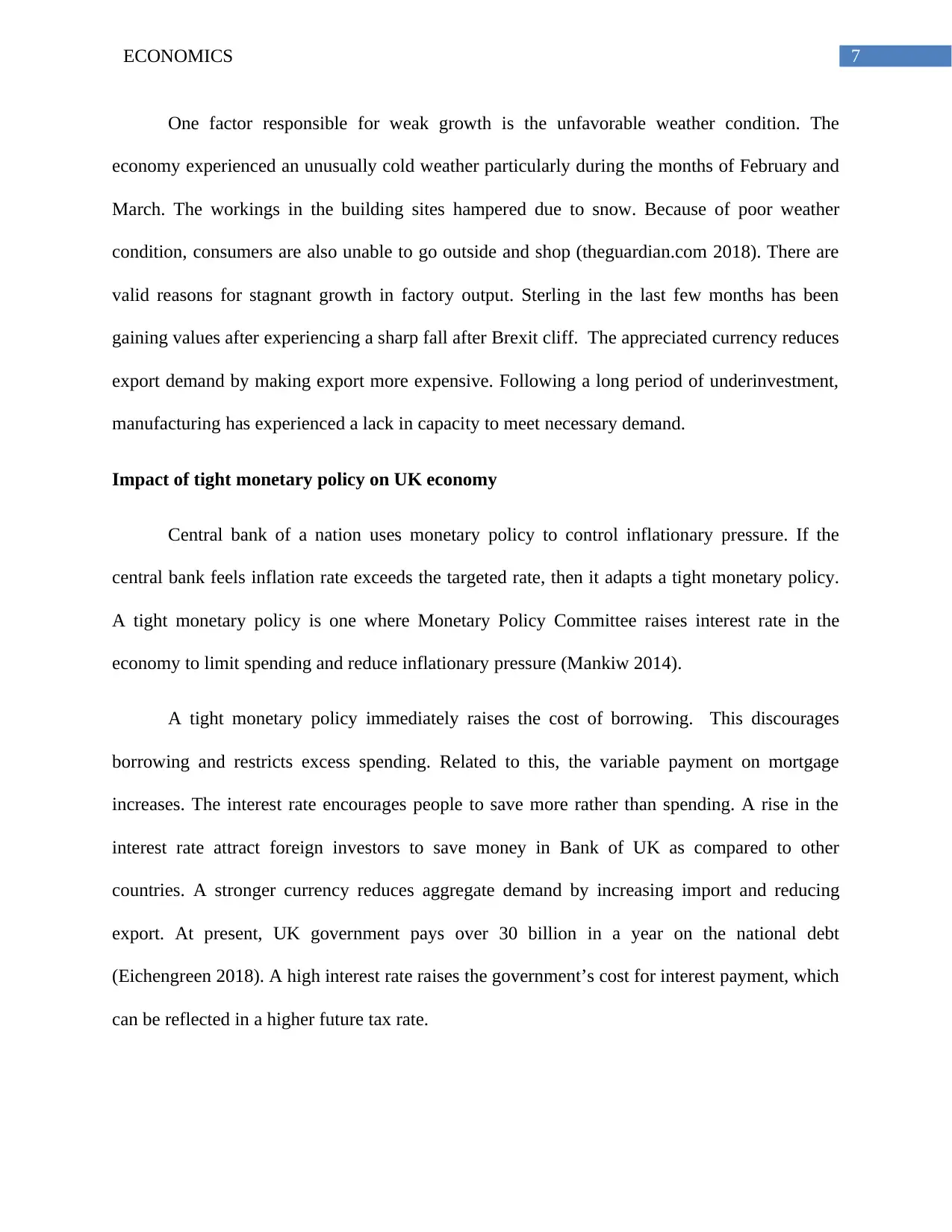
7ECONOMICS
One factor responsible for weak growth is the unfavorable weather condition. The
economy experienced an unusually cold weather particularly during the months of February and
March. The workings in the building sites hampered due to snow. Because of poor weather
condition, consumers are also unable to go outside and shop (theguardian.com 2018). There are
valid reasons for stagnant growth in factory output. Sterling in the last few months has been
gaining values after experiencing a sharp fall after Brexit cliff. The appreciated currency reduces
export demand by making export more expensive. Following a long period of underinvestment,
manufacturing has experienced a lack in capacity to meet necessary demand.
Impact of tight monetary policy on UK economy
Central bank of a nation uses monetary policy to control inflationary pressure. If the
central bank feels inflation rate exceeds the targeted rate, then it adapts a tight monetary policy.
A tight monetary policy is one where Monetary Policy Committee raises interest rate in the
economy to limit spending and reduce inflationary pressure (Mankiw 2014).
A tight monetary policy immediately raises the cost of borrowing. This discourages
borrowing and restricts excess spending. Related to this, the variable payment on mortgage
increases. The interest rate encourages people to save more rather than spending. A rise in the
interest rate attract foreign investors to save money in Bank of UK as compared to other
countries. A stronger currency reduces aggregate demand by increasing import and reducing
export. At present, UK government pays over 30 billion in a year on the national debt
(Eichengreen 2018). A high interest rate raises the government’s cost for interest payment, which
can be reflected in a higher future tax rate.
One factor responsible for weak growth is the unfavorable weather condition. The
economy experienced an unusually cold weather particularly during the months of February and
March. The workings in the building sites hampered due to snow. Because of poor weather
condition, consumers are also unable to go outside and shop (theguardian.com 2018). There are
valid reasons for stagnant growth in factory output. Sterling in the last few months has been
gaining values after experiencing a sharp fall after Brexit cliff. The appreciated currency reduces
export demand by making export more expensive. Following a long period of underinvestment,
manufacturing has experienced a lack in capacity to meet necessary demand.
Impact of tight monetary policy on UK economy
Central bank of a nation uses monetary policy to control inflationary pressure. If the
central bank feels inflation rate exceeds the targeted rate, then it adapts a tight monetary policy.
A tight monetary policy is one where Monetary Policy Committee raises interest rate in the
economy to limit spending and reduce inflationary pressure (Mankiw 2014).
A tight monetary policy immediately raises the cost of borrowing. This discourages
borrowing and restricts excess spending. Related to this, the variable payment on mortgage
increases. The interest rate encourages people to save more rather than spending. A rise in the
interest rate attract foreign investors to save money in Bank of UK as compared to other
countries. A stronger currency reduces aggregate demand by increasing import and reducing
export. At present, UK government pays over 30 billion in a year on the national debt
(Eichengreen 2018). A high interest rate raises the government’s cost for interest payment, which
can be reflected in a higher future tax rate.
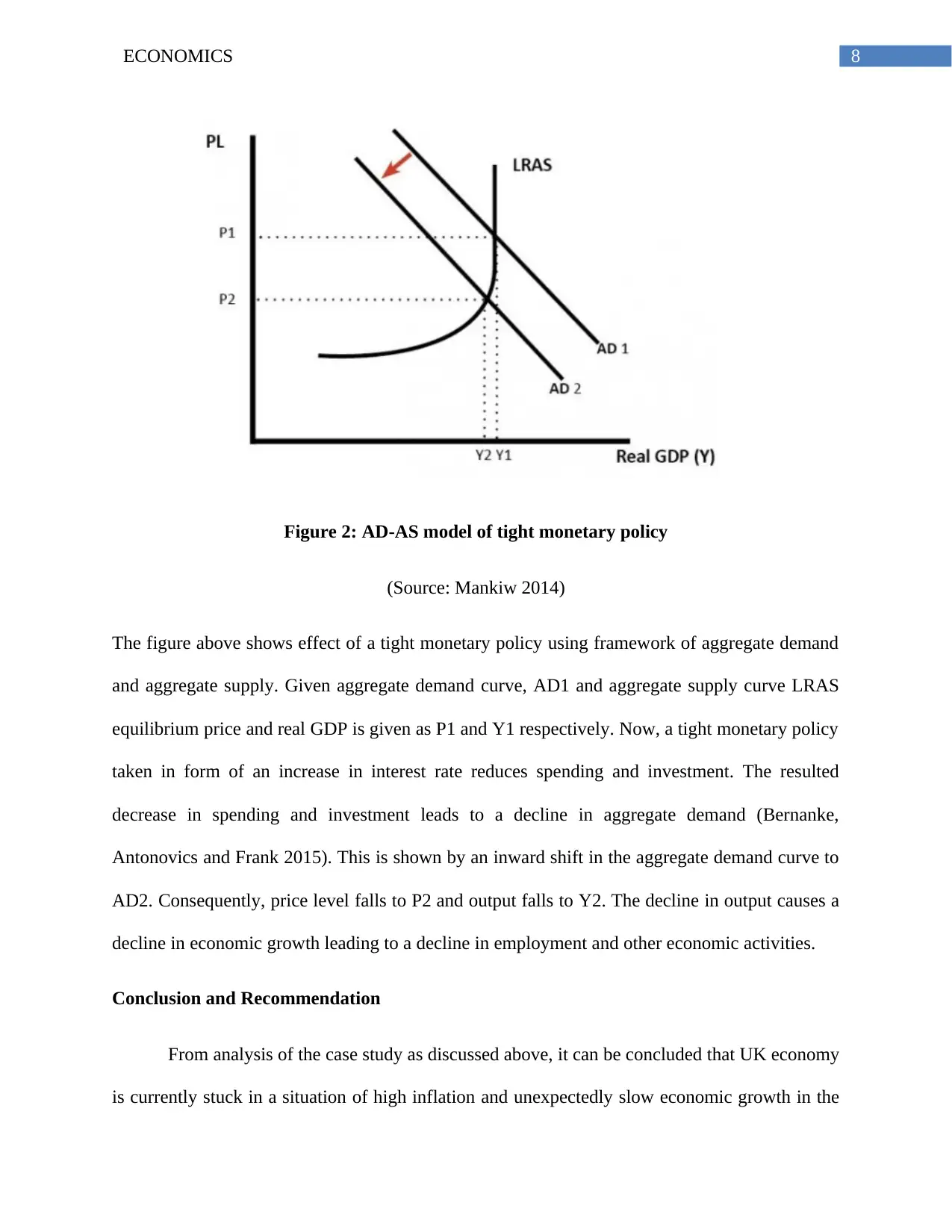
8ECONOMICS
Figure 2: AD-AS model of tight monetary policy
(Source: Mankiw 2014)
The figure above shows effect of a tight monetary policy using framework of aggregate demand
and aggregate supply. Given aggregate demand curve, AD1 and aggregate supply curve LRAS
equilibrium price and real GDP is given as P1 and Y1 respectively. Now, a tight monetary policy
taken in form of an increase in interest rate reduces spending and investment. The resulted
decrease in spending and investment leads to a decline in aggregate demand (Bernanke,
Antonovics and Frank 2015). This is shown by an inward shift in the aggregate demand curve to
AD2. Consequently, price level falls to P2 and output falls to Y2. The decline in output causes a
decline in economic growth leading to a decline in employment and other economic activities.
Conclusion and Recommendation
From analysis of the case study as discussed above, it can be concluded that UK economy
is currently stuck in a situation of high inflation and unexpectedly slow economic growth in the
Figure 2: AD-AS model of tight monetary policy
(Source: Mankiw 2014)
The figure above shows effect of a tight monetary policy using framework of aggregate demand
and aggregate supply. Given aggregate demand curve, AD1 and aggregate supply curve LRAS
equilibrium price and real GDP is given as P1 and Y1 respectively. Now, a tight monetary policy
taken in form of an increase in interest rate reduces spending and investment. The resulted
decrease in spending and investment leads to a decline in aggregate demand (Bernanke,
Antonovics and Frank 2015). This is shown by an inward shift in the aggregate demand curve to
AD2. Consequently, price level falls to P2 and output falls to Y2. The decline in output causes a
decline in economic growth leading to a decline in employment and other economic activities.
Conclusion and Recommendation
From analysis of the case study as discussed above, it can be concluded that UK economy
is currently stuck in a situation of high inflation and unexpectedly slow economic growth in the
⊘ This is a preview!⊘
Do you want full access?
Subscribe today to unlock all pages.

Trusted by 1+ million students worldwide
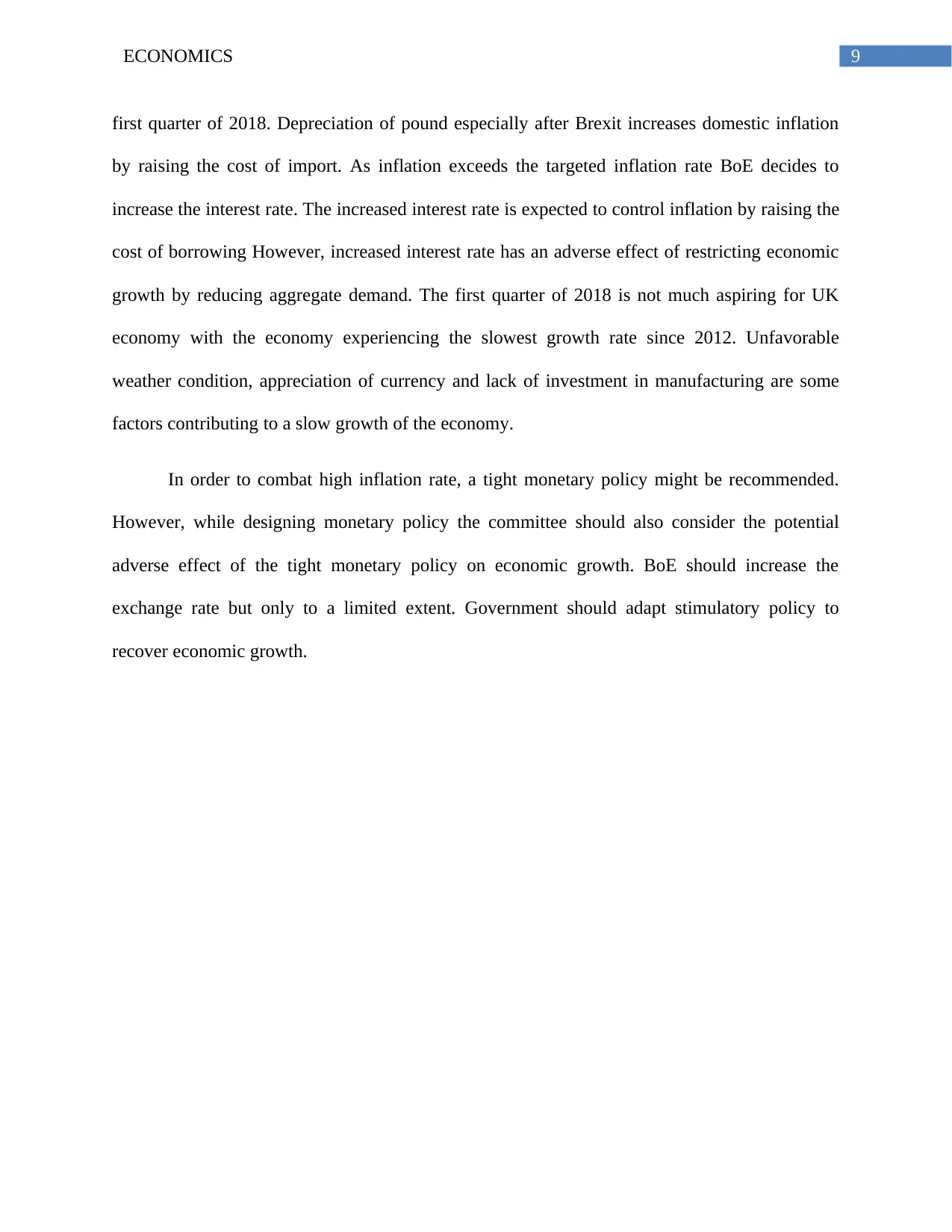
9ECONOMICS
first quarter of 2018. Depreciation of pound especially after Brexit increases domestic inflation
by raising the cost of import. As inflation exceeds the targeted inflation rate BoE decides to
increase the interest rate. The increased interest rate is expected to control inflation by raising the
cost of borrowing However, increased interest rate has an adverse effect of restricting economic
growth by reducing aggregate demand. The first quarter of 2018 is not much aspiring for UK
economy with the economy experiencing the slowest growth rate since 2012. Unfavorable
weather condition, appreciation of currency and lack of investment in manufacturing are some
factors contributing to a slow growth of the economy.
In order to combat high inflation rate, a tight monetary policy might be recommended.
However, while designing monetary policy the committee should also consider the potential
adverse effect of the tight monetary policy on economic growth. BoE should increase the
exchange rate but only to a limited extent. Government should adapt stimulatory policy to
recover economic growth.
first quarter of 2018. Depreciation of pound especially after Brexit increases domestic inflation
by raising the cost of import. As inflation exceeds the targeted inflation rate BoE decides to
increase the interest rate. The increased interest rate is expected to control inflation by raising the
cost of borrowing However, increased interest rate has an adverse effect of restricting economic
growth by reducing aggregate demand. The first quarter of 2018 is not much aspiring for UK
economy with the economy experiencing the slowest growth rate since 2012. Unfavorable
weather condition, appreciation of currency and lack of investment in manufacturing are some
factors contributing to a slow growth of the economy.
In order to combat high inflation rate, a tight monetary policy might be recommended.
However, while designing monetary policy the committee should also consider the potential
adverse effect of the tight monetary policy on economic growth. BoE should increase the
exchange rate but only to a limited extent. Government should adapt stimulatory policy to
recover economic growth.
Paraphrase This Document
Need a fresh take? Get an instant paraphrase of this document with our AI Paraphraser
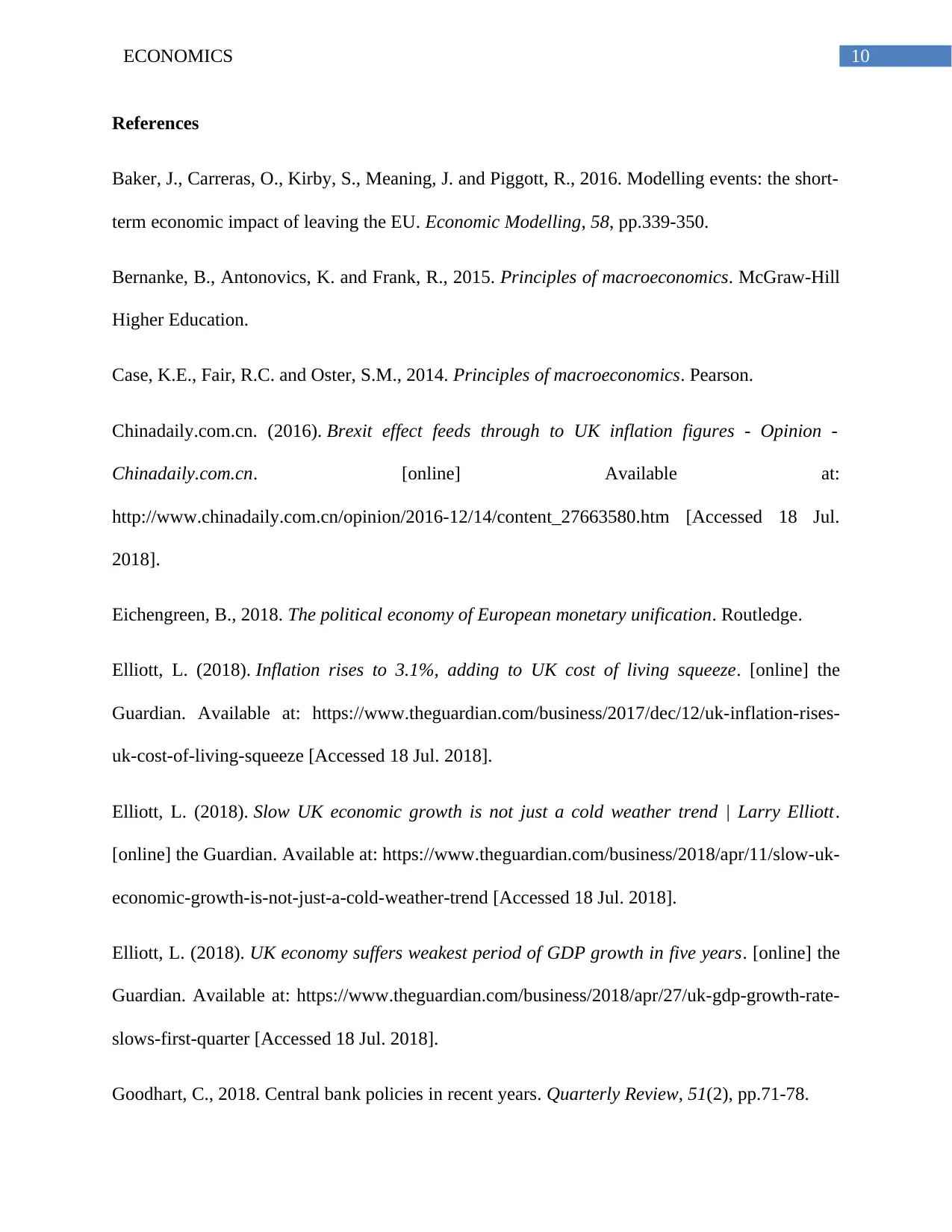
10ECONOMICS
References
Baker, J., Carreras, O., Kirby, S., Meaning, J. and Piggott, R., 2016. Modelling events: the short-
term economic impact of leaving the EU. Economic Modelling, 58, pp.339-350.
Bernanke, B., Antonovics, K. and Frank, R., 2015. Principles of macroeconomics. McGraw-Hill
Higher Education.
Case, K.E., Fair, R.C. and Oster, S.M., 2014. Principles of macroeconomics. Pearson.
Chinadaily.com.cn. (2016). Brexit effect feeds through to UK inflation figures - Opinion -
Chinadaily.com.cn. [online] Available at:
http://www.chinadaily.com.cn/opinion/2016-12/14/content_27663580.htm [Accessed 18 Jul.
2018].
Eichengreen, B., 2018. The political economy of European monetary unification. Routledge.
Elliott, L. (2018). Inflation rises to 3.1%, adding to UK cost of living squeeze. [online] the
Guardian. Available at: https://www.theguardian.com/business/2017/dec/12/uk-inflation-rises-
uk-cost-of-living-squeeze [Accessed 18 Jul. 2018].
Elliott, L. (2018). Slow UK economic growth is not just a cold weather trend | Larry Elliott.
[online] the Guardian. Available at: https://www.theguardian.com/business/2018/apr/11/slow-uk-
economic-growth-is-not-just-a-cold-weather-trend [Accessed 18 Jul. 2018].
Elliott, L. (2018). UK economy suffers weakest period of GDP growth in five years. [online] the
Guardian. Available at: https://www.theguardian.com/business/2018/apr/27/uk-gdp-growth-rate-
slows-first-quarter [Accessed 18 Jul. 2018].
Goodhart, C., 2018. Central bank policies in recent years. Quarterly Review, 51(2), pp.71-78.
References
Baker, J., Carreras, O., Kirby, S., Meaning, J. and Piggott, R., 2016. Modelling events: the short-
term economic impact of leaving the EU. Economic Modelling, 58, pp.339-350.
Bernanke, B., Antonovics, K. and Frank, R., 2015. Principles of macroeconomics. McGraw-Hill
Higher Education.
Case, K.E., Fair, R.C. and Oster, S.M., 2014. Principles of macroeconomics. Pearson.
Chinadaily.com.cn. (2016). Brexit effect feeds through to UK inflation figures - Opinion -
Chinadaily.com.cn. [online] Available at:
http://www.chinadaily.com.cn/opinion/2016-12/14/content_27663580.htm [Accessed 18 Jul.
2018].
Eichengreen, B., 2018. The political economy of European monetary unification. Routledge.
Elliott, L. (2018). Inflation rises to 3.1%, adding to UK cost of living squeeze. [online] the
Guardian. Available at: https://www.theguardian.com/business/2017/dec/12/uk-inflation-rises-
uk-cost-of-living-squeeze [Accessed 18 Jul. 2018].
Elliott, L. (2018). Slow UK economic growth is not just a cold weather trend | Larry Elliott.
[online] the Guardian. Available at: https://www.theguardian.com/business/2018/apr/11/slow-uk-
economic-growth-is-not-just-a-cold-weather-trend [Accessed 18 Jul. 2018].
Elliott, L. (2018). UK economy suffers weakest period of GDP growth in five years. [online] the
Guardian. Available at: https://www.theguardian.com/business/2018/apr/27/uk-gdp-growth-rate-
slows-first-quarter [Accessed 18 Jul. 2018].
Goodhart, C., 2018. Central bank policies in recent years. Quarterly Review, 51(2), pp.71-78.

11ECONOMICS
Mankiw, N.G., 2014. Principles of macroeconomics. Cengage Learning.
Ons.gov.uk. (2018). Inflation and price indices - Office for National Statistics. [online] Available
at: https://www.ons.gov.uk/economy/inflationandpriceindices [Accessed 18 Jul. 2018].
Partington, R. (2018). Bank of England poised to push interest rates back up to 0.5%. [online]
the Guardian. Available at: https://www.theguardian.com/business/2017/oct/29/bank-england-
push-interest-rate-uk-up-05-economy [Accessed 18 Jul. 2018].
Swanson, E.T. and Williams, J.C., 2014. Measuring the effect of the zero lower bound on
medium-and longer-term interest rates. American Economic Review, 104(10), pp.3154-85.
The Independent. (2018). Five reasons why the Bank of England’s interest rate rise is a good
idea. [online] Available at: https://www.independent.co.uk/news/business/analysis-and-
features/uk-interest-rates-rise-reasons-why-bank-of-england-good-idea-saving-borrowing-
complacency-sterling-a8033941.html [Accessed 18 Jul. 2018].
Mankiw, N.G., 2014. Principles of macroeconomics. Cengage Learning.
Ons.gov.uk. (2018). Inflation and price indices - Office for National Statistics. [online] Available
at: https://www.ons.gov.uk/economy/inflationandpriceindices [Accessed 18 Jul. 2018].
Partington, R. (2018). Bank of England poised to push interest rates back up to 0.5%. [online]
the Guardian. Available at: https://www.theguardian.com/business/2017/oct/29/bank-england-
push-interest-rate-uk-up-05-economy [Accessed 18 Jul. 2018].
Swanson, E.T. and Williams, J.C., 2014. Measuring the effect of the zero lower bound on
medium-and longer-term interest rates. American Economic Review, 104(10), pp.3154-85.
The Independent. (2018). Five reasons why the Bank of England’s interest rate rise is a good
idea. [online] Available at: https://www.independent.co.uk/news/business/analysis-and-
features/uk-interest-rates-rise-reasons-why-bank-of-england-good-idea-saving-borrowing-
complacency-sterling-a8033941.html [Accessed 18 Jul. 2018].
⊘ This is a preview!⊘
Do you want full access?
Subscribe today to unlock all pages.

Trusted by 1+ million students worldwide
1 out of 12
Related Documents
Your All-in-One AI-Powered Toolkit for Academic Success.
+13062052269
info@desklib.com
Available 24*7 on WhatsApp / Email
![[object Object]](/_next/static/media/star-bottom.7253800d.svg)
Unlock your academic potential
Copyright © 2020–2026 A2Z Services. All Rights Reserved. Developed and managed by ZUCOL.




